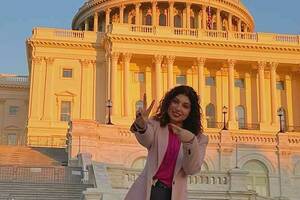
Growing up in a multicultural family, Faiza Filali has always been drawn to the study of peace. In this student profile, Filali describes what drew her to Notre Dame, expounds on the experiences she’s had so far and hopes to have in the future, and explains the importance of cultural experiences to growth and development.
What led you to study at Notre Dame?
I didn't grow up as a die-hard fighting Irish fan. Though there is a huge Notre Dame presence where I grew up in New Orleans, I wasn't really drawn to the University until I looked into its political science and peace studies departments. Having experienced the dichotomy of growing up in both New Orleans and Morocco, I knew the Kroc Institute would afford me the opportunities to make a direct impact on the world. This ultimately led me to choose Notre Dame for my undergraduate degree.
What led you to peace studies? How did you get connected with the Kroc Institute?
Growing up with a multicultural perspective was key for me to develop an interest in peace studies. I've always loved politics, but as I was nearing the end of my high school career, I realized that I was specifically interested in the intersection of peace and societal development. It was actually a high school teacher who introduced me to the Kroc Institute and led me to more seriously consider Notre Dame. Additionally, I had read research by Professor Atalia Omer before even applying to Notre Dame. Then, when I got in, it felt like everything aligned--the academic opportunities, the peace studies program, and, of course, being able to experience all four seasons!
Have you participated in any fun, notable activities related to your peace studies curriculum? If so, what?
I have just submitted my application for study abroad in 2025, which I hope will take me to Seoul! To that end, I plan to use a Summer Language Abroad Grant both to complete my Hesburgh-Yusko Scholars global studies requirement and build my fluency in Korean. I speak a few other languages already--Darija, Arabic, French, and English--so learning Korean would round out my worldly languages. Already I’ve made use of my peace studies curriculum in a professional sense. I spent last summer interning for the Borgen Project, a nonprofit dedicated to ending global poverty. Currently, I am studying abroad in Washington, D.C. and interning with the National Committee on North Korea, which is an NGO under Mercy Corps. This experience has given me the opportunity to experience the administrative perspective of working with a large nonprofit.
What advice would you give an incoming freshman who is interested in studying peace?
Take the jump, but be cautious and respectful, because peace studies is so much more than hippies and anti-war movements. I think the best way to approach studying peace is to learn how to ask questions and analyze motivations and the aftereffects of events. Keep an open mind when you figure out the answers to these questions. Always take into consideration the human perspective. It's so easy to forget we're talking about real, living people in peace studies and not just far-away hypotheticals.